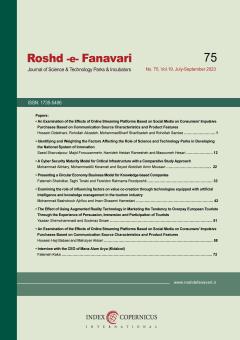Presenting a circular economy business model for knowledge-based companies
Subject Areas : توسعه مدلهای کسب و کار در بنگاههای کوچک و متوسطFatemeh Shahdkar 1 , taghi torabi 2 , Fereydoon Rahnama Roodposhti 3
1 - PhD student of International Entrepreneurship - Islamic Azad University - United Arab Emirates branch
2 - Islamic Azad University - Science and Research Branch - Faculty of Management and Economics - Department of Economics - Tehran - Iran
3 - Islamic Azad University, Science and Research Branch, Faculty of Management and Accounting, Department of Management, Tehran, Iran
Keywords: Business Models , Linear Economy, Circular Economy , Knowledge-Based Companies , Circular Economy Business Models.,
Abstract :
Circular economy is a valuable approach to achieving the concept of sustainability that promotes social equity, economic growth and development, and environmental protection. The main purpose of this study was to present a circular economy business model for knowledge-based companies. In terms of purpose, this research is in the category of fundamental-developmental research, and in terms of subject and nature, the approach of qualitative research is exploratory, and grounded theory (systematic) was used. Data were collected through documentary sources (books, articles, dissertations) and semi-structured interviews with 15 academic and non-academic experts through purposeful theoretical sampling to saturate the required information and theoretical adequacy. The data were analyzed based on grounded theory in the framework of open-source, axial, and selective codes. The results of qualitative data analysis of the research, led to the presentation of the business model of circular economy with 124 categories, 17 central categories, and 6 main factors, in the form of 6 dimensions including causal conditions (2 categories), the main phenomenon (circular business model), Strategy (4 categories), contextual characteristics (5 categories), intervening conditions (2 categories) and consequence (4 categories). The model obtained from this research can be a way for stakeholders, planners, and managers of knowledge-based companies to produce and distribute goods and services in the present century.
